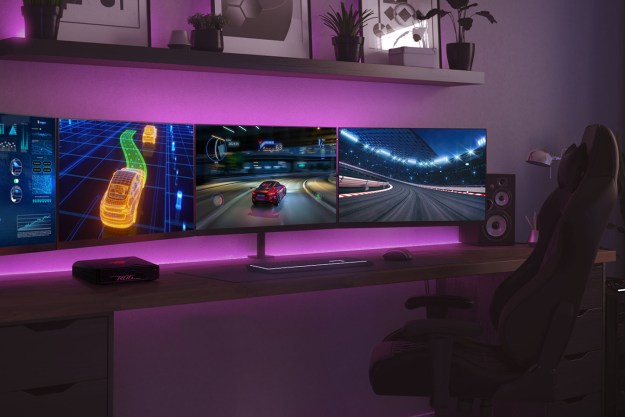Handheld fever is ramping up. Lenovo is working on a handheld competitor to the Asus ROG Ally and Steam Deck, according to a report from Windows Central, which is called the Legion Go.
The report says that the device will launch with an AMD Phoenix processor along with an 8-inch display. It’s not clear if it will use the AMD Ryzen Z1 Extreme as the ROG Ally does, but the report suggests it will launch with one of AMD’s Zen 4 mobile processors.

Although it’s not clear if the device will use the Ryzen Z1 Extreme, there’s a good chance it will use AMD’s Ryzen 7840U. This is the chip inside devices like the Ayaneo 2S, and it’s basically the Z1 Extreme under a different naming scheme. It sports eight Zen 4 CPU cores, as well as an adjustable power range from 15 watts to 30W, just like the ROG Ally.
We don’t have anything official to go off of right now. In fact, the image above is of the Legion Play, which was a cloud-based handheld device similar to the Razer Edge and Logitech G Cloud that never made it to market. We also don’t have any word on pricing or availability. As the report points out, there’s a chance this product could never make it to store shelves.
That seems unlikely given what the report says about the device, however. AMD is making its efficient mobile chip available to more brands, and it seems that handheld devices like the ROG Ally and Steam Deck are bringing in the money. According to some reports, the ROG Ally has already sold over 500,000 units, with the Steam Deck sitting at close to 3 million sales.
The main question is when we’ll hear about the device and what it will do to stand out from other Windows-based handhelds. We don’t have any word on an announcement, but Lenovo has a great opportunity to improve on the user experience that devices like the Ayaneo 2S and ROG Ally offer.
As you can read in our Asus ROG Ally review, the Achilles heel of that device is its software. It’s basically a laptop with a controller strapped on, much unlike the Steam Deck, which feels like a proper game console with its proprietary operating system. The report says that the Legion Go will run Windows 11, but there’s a chance Lenovo has built a utility to run on top of the operating system.
For now, all we can do is wait for when (and if) Lenovo shares more. In the meantime, you can read our Asus ROG Ally versus Steam Deck comparison to see how AMD’s Ryzen Z1 Extreme stacks up against Valve’s handheld.
Editors' Recommendations
- I want to love Asus’ gaming earbuds, but there are problems
- I would give up my Steam Deck if the ROG Ally 2 had these features
- A Redditor ‘didn’t know’ about the Steam Deck, so they built their own
- Is this Razer’s Steam Deck killer?
- Steam Deck 2: release date speculation, specs, pricing




